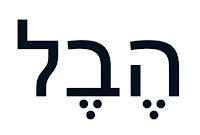Lately I've been reading the book of Ecclesiastes. Not only that, I'm translating the Hebrew for myself. Already in Eccl. 1:2, I've hit a pothole. Here's the Hebrew word that's stumping me.
And here's how its been rendered in various translations:
- NIV: meaningless
- ESV: vanity
- CSB: futility
- GW: pointless
- GNT: useless
- NET: futile
- Luther: eitel
- SCH1951: Eitelkeit
- SCH2000: Nichtigkeit
- LBLA: vanidad
The NIV reads as follows:
"Meaningless! Meaningless!" says the Teacher. "Utterly meaningless! Everything is meaningless!"
I'm not very happy with this translation or with the other renderings either. The Hebrew word is hevel. It refers to breath or vapor. The Teacher uses it 38 times in Ecclesiastes so it's a key term. He uses it to describe human existence. Life, he says, is like a fog you're stuck in that makes it impossible for you to see clearly. It looks solid but it keeps slipping through your fingers. It's like trying to grab hold of the wind. You simply can't. My mind goes to Wile E. Coyote who never catches the Roadrunner. I feel the best English word for hevel is vaporous. Vaporous comes from the Latin adjective vaporus, "full of steam or vapor." Synonyms include:
- cloudy
- foggy
- misty
- hazy
- murky
- drizzly
That's what life is like, says the Teacher. It's filled with vapor. It's both fleeting and lacking in clarity. Hence my translation:
"Vaporous! Vaporous!" says the Teacher. "Utterly vaporous! Everything is vaporous!"
Stay tuned for more observations on the Hebrew text of Ecclesiastes (and mightily bored you'll be).

